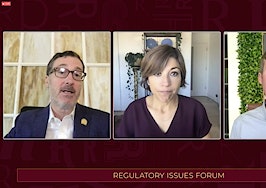After a lively and wide-ranging debate, a committee of the National Association of Realtors has shelved, at least for now, a controversial proposal that would have required listings submitted to Realtor-affiliated multiple listing services to include a property address that would be visible to other subscribers.
NAR’s Multiple Listing Issues and Policies Committee also approved eight policy change proposals that will now go forward to the trade group’s board of directors on Friday, Nov. 13.
The proposals were created by the committee’s MLS Standards Work Group, which was charged with considering the criteria and enforcement process for minimum MLS standards for Realtor-affiliated MLSs, similar to core standards for Realtor associations. The eight proposals are the first phase of a two-phase approach. The second phase will involve gathering industry feedback and developing MLS standards and an enforcement process for spring 2021, according to work group co-chair Jon Coile.
The proposals would mandate that agents and brokers who receive more than three administrative sanctions in a calendar year be required to attend a hearing and would mandate that MLSs process complaints anonymously when the complainant requests it.
The proposed standards would also require that MLSs implement a process for identifying potential violations of fair housing laws, that MLSs provide the same data fields under Web API data feeds that they provide under other types of feeds, and that MLSs display customer service and technical support contact information on their websites. MLSs would also be required to mandate that agents and brokers submit accurate listing data and correct any known errors.
Most of the nine policy proposals prompted discussion during a nearly three-hour committee meeting, but none more so than the proposal to require property addresses be submitted to MLSs when an address exists. The proposal did not pertain to disclosure to the public, but rather to other members of the same MLS.
The stated rational for the proposal was: “The property address is a key piece of listing content needed by brokers and licensees to serve the interests of their clients and customers. Disclosure of a listing address at the time of filing is consistent with the MLS’s three tenets of: efficiency, transparency, and collaboration.”
‘Edge cases’
But some on the committee wanted exceptions for when law enforcement or other government officials deemed address disclosure a safety issue or for celebrity clients who didn’t want other agents giving out their addresses to news media.
Shawn Dauphine, MLS director for the Houston Association of Realtors, noted that HAR implemented a “private per seller” property class months ago that allowed listings to not be distributed to any public listing sites in order to entice sellers to list in the MLS who might have otherwise kept their properties off the MLS.
Out of 41,000 listings in the MLS, only 32 have chosen to use that class and only eight of those 32 have chosen to not include an address, according to Dauphine.
“These are very edge cases. I think we all agree that an address is very important to a listing and 99.999 percent of the cases there’s going to be an address in the MLS because the seller wants people to know where his property is located and he wants to sell the property,” he said.
“But there are edge cases … whether it’s law enforcement, somebody who’s a victim of domestic violence, or a high-profile client. There are cases, where the address may not want to be displayed, that we want them to put it in the MLS. We want other participants to have a chance to preview those listings, where they traditionally haven’t done that before.”
He proposed an amendment that would require addresses be entered if they are “publicly marketed,” not just when an address exists. Others spoke in favor of the amendment, but Debbie Wey, vice president of MLS administration at Canopy MLS in Charlotte, North Carolina, spoke against it.
“If you don’t publish the address on the listing, that requires the cooperating broker to contact the listing broker to get more information about the listing [and] to potentially show the property, which impedes the ability of that transaction to happen and it gives the listing broker the opportunity to pick and choose what communications they want to respond to,” she said.
Others said MLSs should be able to tailor their local rules to handle property addresses rather than instituting a national policy.
‘Equal opportunity doesn’t stop at a certain listing price’
But work group co-chair Chris Carrillo, CEO of Metro MLS in Wisconsin, said the committee should be considering the original intent of the Clear Cooperation Policy, which NAR approved last year and requires listing brokers to submit a listing to their MLS within one business day of marketing a property to the public.
“[That policy] distinctly made a line in the sand. That line favored equal opportunity for buyers and sellers for transparency of property information, period. Anything that you do against that creates a slippery slope,” Carrillo said.
“The concerns of high-profile individuals, whether they be law enforcement, first responders, the Hollywood elite, who seek an additional layer of privacy, this can be accomplished right now under existing policy. For those who are so concerned about privacy, there’s an option for exclusive agency or exclusive office listing.
“I worry about the daylight it gives those who want to circumvent cooperation. It’s really difficult to offer transparency for a property that doesn’t have an address. How does anybody run a map search if you don’t have an address of a property? I’m sorry but Clear Cooperation and equal opportunity doesn’t just stop at a certain listing price.”
Another committee member made a motion to refer the policy back to committee, which superseded any vote on the policy amendment, and more than two-thirds of the committee members voted to send it back, tabling it for now.
The policy proposals that will go forward
The committee did approve eight policy recommendations for MLS standards, most after some debate. The first recommendation would add guidance to the NAR MLS Handbook for issuing administrative sanctions, including possible fines and discipline. The guidance would not be mandatory. The remaining recommendations would be mandatory if approved.
The second recommendation reads: “MLS Participants and Subscribers can receive no more than three (3) administrative sanctions in a calendar year before they are required to attend a hearing for their actions and potential violations of MLS rules, except that the MLS may allow more administrative sanctions for violations of listing information provided by Participants and Subscribers before requiring a hearing.”
The third recommendation would require that the MLS send a copy of all administrative sanctions against a subscriber to his or her participant (supervising broker or broker representative) and that the participant be required to attend hearings of a subscriber who has received more than three administrative sanctions within a calendar year.
The work group’s stated rationale for the recommendations was: “Participants and subscribers must be held accountable to the MLS rules. The changes also emphasize the importance of a Participant’s oversight for the actions of their affiliated subscribers.”
Coile expanded on that during the meeting, noting that the policies would target “frequent flyers.”
“There are some people who don’t mind sanctions and so they just pay a fine and they keep doing their business. What’s fundamentally most important for the MLS is good data, accurate data. If we don’t have a good data and accurate data in our database, what are we?” he said.
“We decided that if you get three administrative sanctions in a year, you really shouldn’t be able to just keep paying the fines as a cost of doing business.”
The hearing requirement would be a deterrent, but could also be a learning opportunity for the agent as well as an opportunity to explain themselves, according to Coile. After one MLS executive questioned whether the new policies would preclude other enforcement mechanisms the MLS has developed locally, Coile said they would not.
Another MLS exec worried about “over-regulating,” while another emphasized the need for consistent rules across MLSs so that brokers know what is expected of them.
The fourth policy recommendation reads: “That MLSs be required to process a complaint without revealing the complainant’s identity and that the MLS Committee, Grievance Committee, MLS staff, or other representative serve as the complainant if the complaint is forwarded to a hearing and the original complainant does not consent to participating in the process or disclosure his or her name.”
The rationale of authorizing anonymous complaints of MLS rules is to “eliminate the stigma of bringing questionable actions and business practices of other participants and subscribers to the attention of the MLS,” according to the work group.
Bringing complaints can be a “sensitive issue” for agents who may end up working together on a home sale, according to Carrillo.
“We don’t want to put Realtors in the position where you are going to be in a transaction with a Realtor that maybe you have to send the infraction or send the question in on a listing, perhaps the following week,” he said.
“This just ensures that the MLS can keep that complainant anonymous and that somebody on staff or designee of the MLS can represent this issue, especially if in fact it goes before a hearing.”
When the violation is a data error, the MLS database itself can be the complainant, according to Coile. For instance, at Bright MLS if an agent sees a listing they know is in the wrong ZIP code where the listing agent is trying to game the system to get it into the right school district so it sells faster, the first agent can just click a button to make a complaint, he said. Then the MLS’s staff can look and see if the agent is correct or not and then move forward.
“It’s really the listing agent versus the machine,” he said.
Some MLS execs noted that not all complaints are data-driven and expressed concern about due process. Others said they would never have heard about major rule violations if subscribers were not allowed to remain anonymous, which would affect the integrity of the MLS data.
The fifth policy recommendation reads: “That Web API data feeds must include no less than the same data fields provided to participants and subscribers via other data feeds, such as RETS or FTP systems.”
MLSs are required to comply with data standards from the Real Estate Standards Organization (RESO), including the requirement to have a Web API. But some MLSs have decided to follow the letter of the rule, rather than its spirit, by offering an API with fewer data fields than offered under older data feeds, disincentivizing the use of the API, according to Coile.
Sam DeBord, RESO’s CEO, proposed that the policy be recommended to add that “MLS fields that exist in the RESO Data Dictionary must be delivered in conformance with the standard” so that MLSs would not be required to carry over retired or non-standardized fields. The amendment was added and the recommendation was approved.
The sixth policy recommendation reads: “That participants and subscribers be required to submit accurate listing data, and be required to correct any known errors.” There was no discussion of this recommendation and it passed unanimously.
The seventh policy recommendation reads: “That MLSs be required to display customer service and technical support contact information on the MLS website.” There was no discussion of this recommendation and it passed unanimously.
The eighth policy recommendation originally read: “That MLSs implement a process for identifying potential violations of fair housings laws and working with participants and subscribers to rectify such potential violations.”
The work group’s rationale for this policy says, “MLSs play a vital role in providing property information and equal professional services to all consumers. This new policy statement will help MLSs provide compliant fair housing property information.”
Some MLS executives worried that adopting the policy would increase liability for the MLS should there be a fair housing violation, but NAR’s legal team said the MLS would not have any more liability than it currently has.
Carrillo stressed that whether an MLS adopts a process where they screen for discriminatory language or not, that language will or won’t be in the MLS regardless.
“I would say that we’re better than that as an industry. We’re better than just not knowing whether it exists or not in the MLS and we owe it to consumers. We owe it to brokers and agents to be proactive, to try to do the right thing,” he said.
“I’ve heard of ‘what is fair housing violation,’ and I’ll compare it to pornography: you know it when you see it. You may not necessarily have a one-size-fits-all approach to how to determine it, but we should all make efforts to try to do the right thing.”
After much discussion, the committee modified the recommendation to: “That MLSs implement a process for identifying potential violations of fair housing laws and advising Participants and subscribers to remove or correct the potential violation(s).”
The modification was meant to ensure that the responsibility for changing a listing did not fall on the MLS, but rather on the agent and broker whose listing it is. The amended policy passed.
The text of the eight policy recommendations can be found here in the committee’s agenda. Note that two of the recommendations were approved in modified form and therefore will differ from the agenda.
Editor’s note: This story has been updated.













